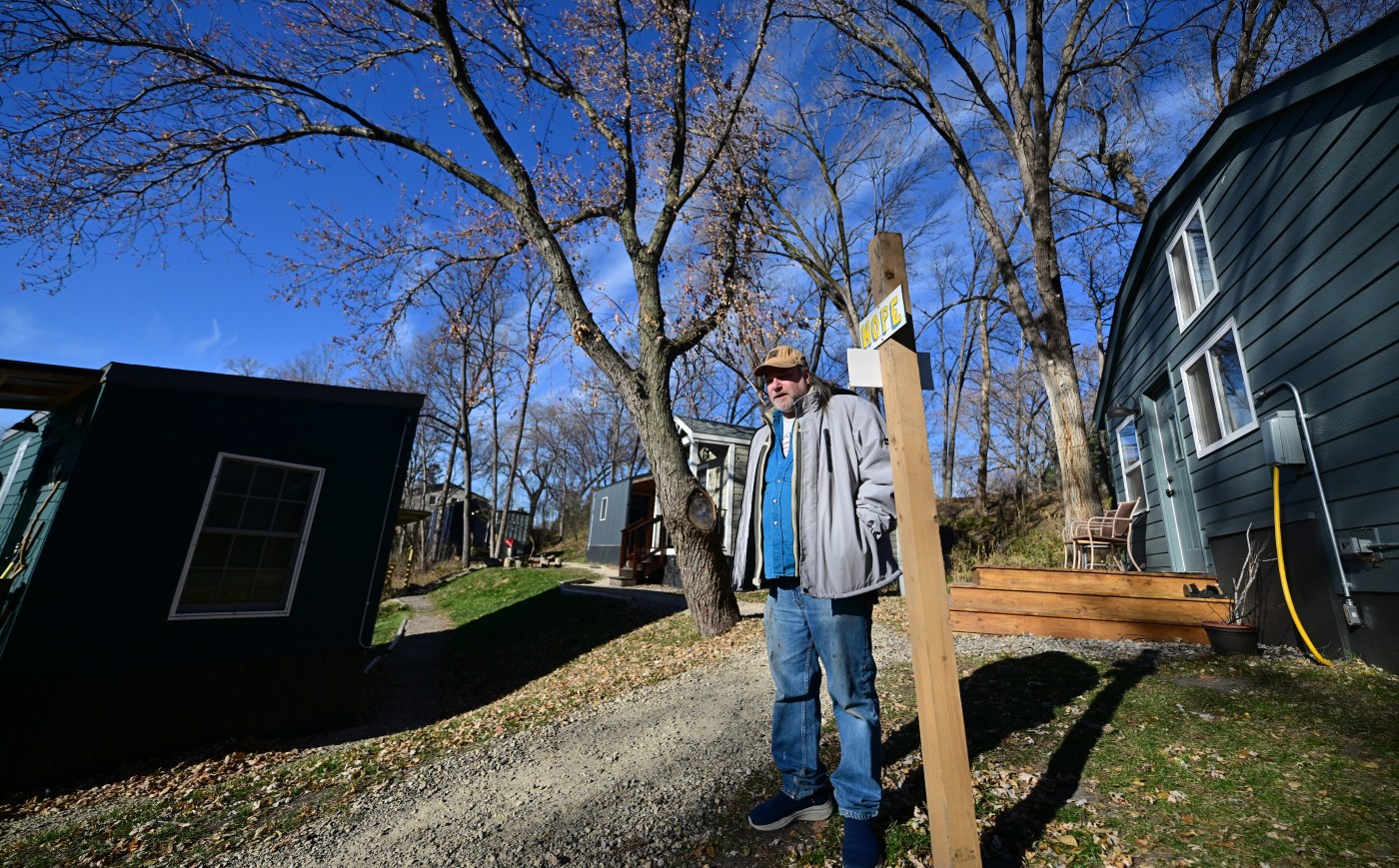
A St. Paul church opened six tiny homes for those experiencing homelessness. Officials are praying the effort goes statewide.
Outgoing, chatty and distractable, Allen Xiong, 29, found a semblance of belonging in St. Paul-area homeless encampments, only to grow tired of seeing his friends and neighbors cleared out every few weeks during the pandemic. Without a similar sense of community, he doubts that whatever housing solutions they were offered stuck.
“We just end up right back where we started,” he said. “Nothing’s solved.”
Resident Allen Xiong sits on the steps of his micro-home at Mosaic Christian Community’s “Sacred Settlement” at the Wheelock Parkway church in St. Paul on Nov, 29. (John Autey / Pioneer Press)
David Doren, 54, was equally tired of living out of his rickety recreational vehicle at leased campsites in Lake Elmo, which required him to relocate every 13 days. He previously spent more than a year living in tents in the woods near St. Paul’s Schmidt Brewery off West Seventh Street.
“It was hell,” said Doren, who is known around the Mosaic Christian Community for being as even-keeled as Xiong is spontaneous. “You’re always moving. Even when you have all the time in the world to relax, you’re not relaxed, because you’re always looking over your shoulder. You get robbed all the time.”
For the past year, the two men have found stabler housing in an unlikely place: cabin-like residences, each measuring between 130 and 260 square feet, on church grounds off St. Paul’s Wheelock Parkway.
‘Sacred Setttlement’
Located in the Payne-Phalen neighborhood near Interstate 35E, the Mosaic Christian Community’s “Sacred Settlement” consists of six small living units built by volunteers from across the Twin Cities metro without government funding or intervention. Those units are home to five previously homeless residents, as well as three “intentional neighbors” who have agreed to serve as navigators of sorts for what’s believed to be the state’s first church-based community of tiny homes.
Each resident receives two keys — one to their housing unit, and another to the church itself, where they can access bathrooms, showers, potable water, lockers and a full kitchen. The residences themselves have small kitchenettes with counter space for a hot plate, a sink with a collection system for gray water, a small refrigerator with a freezer compartment, and shelves for dishes and cookware.
There’s no expectation they attend religious services, but there are small rents. And there are community rules.
Rent is about $200 to $400 a month and based on square footage. Also, formerly homeless residents have the opportunity to participate at a workshop once a week to make hand-crafted home goods. They can also sign up to do jobs at the church such as cleaning. Some do other odd jobs.
“This is not temporary housing,” said Meredith Campbell, who co-leads the church’s Sacred Settlement Mosaic initiative with her husband and lives within walking distance, bringing her four small children to the grounds with her. “This is designed to be permanent housing. People pay rent. They follow policies.”
Legal questions dogged their tiny homes
Sacred Settlement Mosaic is a community that has spent years fighting for the right to exist. Presented with the concept by Gabrielle Clowdus, a research fellow at the University of Minnesota’s Minnesota Design Center, St. Paul city planners scratched their heads over how to tweak or interpret zoning codes to allow for multiple small, non-adjoining residences on a street otherwise lined by suburban-style homes and apartment buildings.
Even with the church building itself providing certain comforts of home, the city’s zoning code was less forgiving.
Discussions back and forth between the city and church took four years, raising the possibility of a legal fight that likely would rest on the federal Religious Land Use and Institutionalized Persons Act, enacted by Congress to help religious institutions avoid state regulation of their property through zoning restrictions.
“I think this was an innovative approach that didn’t quite fit into the current city building code,” Campbell said.
In other parts of the city, St. Paul has wrestled with churches and church-based social service programs over how to interpret RLUIPA, including a legal dispute with the First Lutheran Church over the Listening House day program for the homeless. That fight ended in a legal settlement in 2019, prompting the city to revisit its zoning rules around church-based housing and social services.
Instead of a legal war, the St. Paul City Council in June 2022 approved temporary zoning for Sacred Settlement Mosaic for one year, with the expectation that a successful trial run could be extended for up to an additional 18 months. The clock ran out on their initial year this summer, though it was then extended to Jan. 1, 2024. Roseville created a similar temporary ordinance.
By then, lawmakers such as state Rep. Athena Hollins, DFL-St. Paul, and state Sen. Zaynab Mohamed, DFL-Minneapolis, had created state legislation, modeled after Sacred Settlement Mosaic, clarifying the right of faith communities to seek permits for “micro-unit dwellings” for the chronically homeless or very low-income residents on religious property.
Jamal Love describes himself as an “intentional neighbor,” residing at the Mosaic Christian Community’s “Sacred Settlement” project at the Wheelock Parkway church in St. Paul. Love and his wife, Kim, moved out of their large suburban home to a home that “is as big as my old living room,” to live as a neighbor to the formerly homeless residents now living on the church’s property. (John Autey / Pioneer Press)
New law opens doors to tiny homes statewide
The legislation, which was supported by the progressive interfaith advocacy organization known as the Joint Religious Legislative Coalition, also aims to establish clear building and permitting standards.
The new state rules open the door to more “sacred settlements” statewide and prevent cities from using their zoning code to block them. The St. Paul City Council held a public hearing Dec. 6 on a proposed zoning code amendment that would incorporate the new state language into city ordinances, allowing sacred settlements on religious grounds in any part of the city except an industrial area.
“This is another case where St. Paul took the lead in terms of finding a way to move this forward,” said Council President Amy Brendmoen, who represents the political ward where Sacred Settlement Mosaic is located. “Once we demonstrate that it can be done, it’s easier, I think, for the state Legislature to follow suit.”
Mosaic is the first example of a sacred settlement in Minnesota, and one of the few such communities in the country. In December 2022, the Prince of Peace Lutheran Church in Roseville added two tiny homes to their parking lot and welcomed a woman who had previously been homeless and a family who had not, according to Clowdus, who advocates for the tiny home communities through her nonprofit, known as Settled.
Prince of Peace recently anchored a third unit to the ground, with the expectation of moving in a second resident who had previously been homeless.
“(It’s about) really helping the church invite the outcasts of society to the banquet table, and inspiring faith communities to live a life with the poor,” Clowdus said. “It’s reciprocal, building life together, and being in it for the long haul. And that will enrich the life of the congregation, as well as enrich the lives of people coming off the streets.”
Clowdus said “a collection of faith communities” is in the process of building another three-unit sacred settlement in Duluth.
New rules, regulations
The state legislation comes with a series of regulations, including that the homes have access to nearby potable water, laundry facilities, kitchens, parking and lighting.
The micro-units must have a dry, compostable or plumbed toilet or a similar system that meets Minnesota Pollution Control Agency standards, and an electrical system that meets one of two national standards.
The rules also require access for emergency vehicles.
And between 33% and 40% of residents in the micro-unit community must be designated volunteers approved by the religious institution but who have not experienced homelessness — a core principle of Settled, which highlights the importance of “supportive friends” serving as personal navigators who can link residents to social services.
‘Intentional neighbors’
At Sacred Settlement Mosaic, Jamal and Kim Love occupy one of the larger units as “intentional neighbors,” or volunteers. The two had worked with various homeless efforts for years, including a footcare initiative known as SoleCare for Souls, but they both felt they could do more.
A year ago, the couple moved out of their Oakdale home following construction that roped in volunteers from dozens of churches across the metro. Jamal recalled a framing company that gave its workers a paid day off to help frame three of the houses, free of charge.
“There were times when an entire church would come to build,” he said.
For years, many housing advocates have called for taking a “housing first” approach toward housing those experiencing homelessness, lining up residences for the vulnerable without first requiring sobriety or some other type of personal break-through. The strategy, which has its detractors, is that housing is an essential first step toward other forms of stability.
It’s a philosophy that Jamal says he rejects, in part because without the right supports and sense of community, the likelihood the individual will end up homeless again is high.
Temporary housing is “like giving them hope and then throwing it away,” agreed Xiong, beaming while sitting at a table in the church dining hall surrounded by Campbell, Doren and the Loves. “In these tiny home communities, people find a place where they belong.”
Related Articles
Eagan residents push back against proposed Johnson Bros. Liquors distribution center at former BCBS site
Catalytic converter thefts in St. Paul down 95% since pandemic peak, according to police data
Letters: Among metro transit-rail systems, ours is an outlier — to ill effect
St. Paul teachers contract talks headed to mediation
Judge acquits first defendant in fatal shooting of Alex Becker in St. Paul alley

